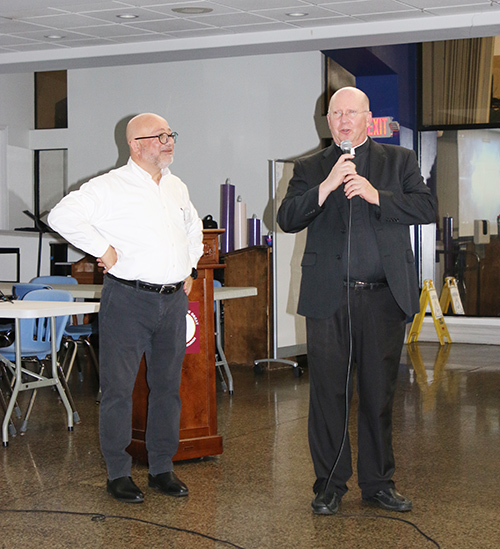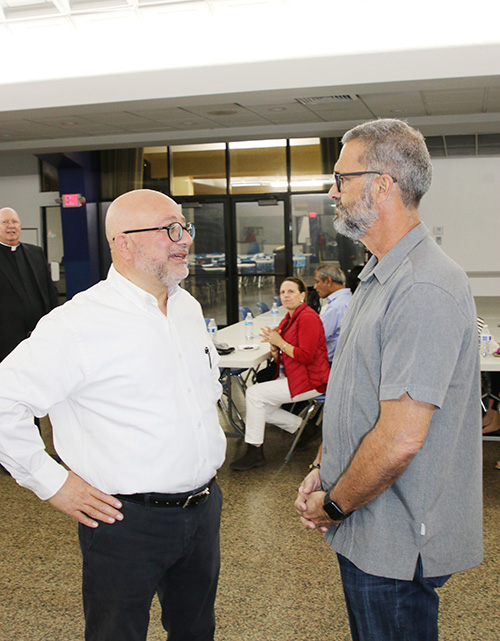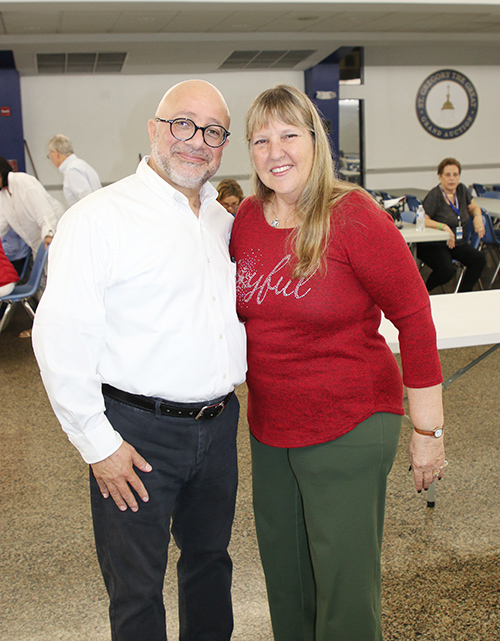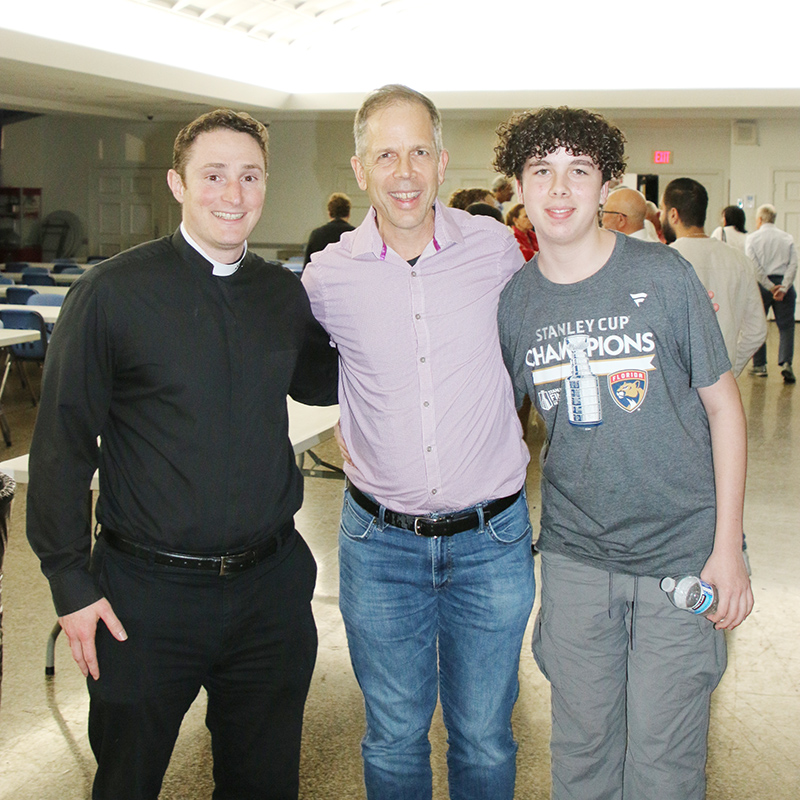By Priscilla Greear - Florida Catholic

Photographer: PRISCILLA GREEAR | FC
Father Michael Davis, pastor of St. Gregory the Great Church in Plantation, introduces Hussam Musleh of Israel, who spoke about the dwindling Christian population in Israel and Palestine at the "Pray for the Peace of Jerusalem" event on Dec. 10, 2024, at St. Gregory.
PLANTATION | As the faithful shift attention during Advent from Gaza and Lebanon to Bethlehem, the sacred sites of Christianity sit nearly empty. Catholic Arab Israeli Hussam Johnny Musleh visits the quiet Church of the Holy Sepulchre in Jerusalem twice a week to pray for peace and light a candle, having been out of work as an Israeli tour guide for a year and a half during wartime.
Musleh spoke Dec. 10, 2024, at St. Gregory the Great Church in Plantation on the ongoing hardship and exodus of Christians in the Holy Land and their intensified suffering amidst the war in Gaza and the collapse of tourism following the Oct. 7, 2023 Hamas terrorist attack on Israel. Musleh is a Palestinian born in Israel whose grandfather fled the 1948 war that resulted in 750,000 Palestinian refugees including 50,000 Christians.
Father Michael Davis, pastor of St. Gregory, a Knight of the Holy Sepulchre, invited his friend Musleh, who has guided 14 out of 15 of his pilgrimages to the Holy Land to speak on “Prayer for the Peace of Jerusalem.” Father Davis, who had to cancel three pilgrimages, hosted the event to offer an Israeli's perspective, to pray for peace, and to show solidarity with the Christian community in the Holy Land. Participants included many past pilgrims.

Photographer: PRISCILLA GREEAR | FC
Hussam Musleh, left, speaks with Peter Portu, a parishioner of the Church of the Little Flower in Coral Gables, at the event entitled "Pray for the Peace of Jerusalem" on Dec. 10, 2024, at St. Gregory the Great Church in Plantation.
“The church of the Holy Sepulchre is one of the holiest places on earth. There is nobody there, totally empty…What has happened as a result is the Christian community is unemployed and struggling. I wanted to do something as a gesture of support,” Father Davis said. “They get frightened and say, ‘I don’t want to live in this part of the world,’ and they leave. And the Christian community is getting smaller and smaller and smaller. They are the people who are the fifth Gospel, the living stones, the roots of Catholicism and Christianity. They were born in that land and are descendants of the original Christians.”
Father Davis opened the evening with Psalm 122 to pray for Jerusalem amidst great turmoil. “We ask that the Holy Spirit fall fresh upon our land and bring peace, harmony and reconciliation,” he prayed. “Bless all of those who minister there and work there, all the Christians who keep the faith alive there.”
Musleh, who speaks Hebrew, Arabic, German, and English and graduated from Bethlehem University, visited the parish with his son, John Paul, on a Christmas trip to Florida. He shared his struggle with unemployment as a tour guide for a year and a half. “I have to pay all my expenses, medical insurance. I have a family. I can’t put food on the table because of my job, zero tourists. This is one of the reasons I’m here to share my suffering, my persecutions. My son has to stop studying because I can’t sponsor his studies in Barcelona,” he said. “During the attack from Iran, we hid in a shelter. My son was outside watching all the rockets come from Iran like Christmas trees. It was terrifying to spend the night in a shelter.”
As an Arab Israeli citizen, he can travel through Israeli checkpoints and borders, especially wearing a cross, but Christians beyond the wall in the West Bank have to obtain burdensome permits to enter Israel. Today, he feels more underlying tensions with his Jewish and Muslim friends and sees more aggressions towards Muslims. Musleh estimates that support for Hamas among Muslims has dropped from about 70 percent before the war to 10 percent today, as the fighters hide in churches and schools, steal humanitarian aid, and inflict intense suffering. Musleh praised the work for peace of the Latin Patriarch of Jerusalem Cardinal Pierbattista Pizzaballa, who this year visited the Holy Family Parish in Gaza, where approximately 500 remaining Palestinian Christians are fed and sheltered. It’s the only Catholic parish in Gaza and its school was bombed. “He’s the only Christian leader who went to Gaza to see the suffering of Christians, to strengthen their resilience, praying with their children in the school and seeing how they destroyed the church and school.”

Photographer: PRISCILLA GREEAR | FC
Corinne Dorey of Holy Name of Jesus Church in West Palm Beach speaks with Arab Catholic Israeli tour guide Hussam Musleh, who guided her pilgrimage to Israel in July 2023. Musleh spoke on Dec. 10, 2024, at St. Gregory the Great Church in Plantation.
With Orthodox, Catholic and Protestant churches in Israel, there are now 150,000 Christians and 50,000 in Jerusalem, Bethlehem, West Bank and Gaza, he reported. In 1948 there were 32,000 Christians in Jerusalem, but now there are only 11,000. The Franciscan Foundation for the Holy Land provides critical support to help Christians stay in the region through housing, medical care, education and churches. It built about 1,000 homes in Jerusalem and the West Bank, including his home on the Mount of Olives. In supporting the Franciscan Foundation, “you are part of our resilience to stay in the Holy Land,” Musleh said.
The biggest needs for these Christians are education, health care and more housing. Many in Israel face unemployment as hotels, restaurants and schools sit empty. With cousins in the West Bank, he said that waiters there earn about $400 a month versus $1,500 a month in Israel. Christians also need help to attend often unaffordable college. “We still need more housing to give people a place to live, study and work,” he said. “There’s also the problem of discrimination. If I want to build a house and have a piece of land, it would cost $250,000 to get the papers to build the house,” said Musleh, who has siblings in Paris and Canada.
Musleh takes “the side of peace” in the war, acknowledging Israel’s right to defend itself and both Jews and Muslims’ historic claim to the land. He prays for the eventual return of tourists, hopeful for a lasting ceasefire. He affirmed the United Nations’ critical role in humanitarian aid. “I’m a tour guide and I spread the faith, I share my faith, my knowledge with others. I’m talking to people, preaching to people. This is my passion showing the people the Holy Land,” he said, joking he’s more Catholic than the pope with his Holy Land credentials. “The Bible becomes totally different when you visit the Holy Land, when you come alive.”
St. Gregory’s parishioner Jim Januszka reflected afterwards, “hopefully there is a light at the end of the tunnel and there is a cease fire and we can see some more development of peace and compromise on both sides.”
Corinne Dorey, who traveled to Israel with Father Davis and Musleh in the summer of 2023, described the experience as amazing. “I learned so much more about how brutal the crucifixion was,” she said. She believes “Jerusalem is the safest place to be because everybody wants that land, so they’re not going to destroy it.”
Recalling being spat on while explaining Jesus on Via Dolorosa in Israel, Father Davis invited others to join him in praying for peace in the Holy Land and for the Christian community that is struggling to survive. “The intensity of religious experience makes it a hot bed of culture and it’s very difficult to find peace.”
Father John Buonocore, parochial vicar at St. Gregory, stressed the need for peace and expressed a deeper desire to pray for those suffering in Gaza and the Middle East. “It is an ecumenical effort that should span Muslim, Jewish and Christian traditions and find some form of peace. We all promote peace but when we live together in close proximity there’s so much tension. It was good to hear from a person who lives and experiences it.”

Photographer: PRISCILLA GREEAR | FC
(Left-Right) Father John Buonocore, parochial vicar at St. Gregory the Great Church in Plantation, poses with parishioners Jim Januszka and his son Joey. They attended the evening to “Pray for the Peace of Jerusalem" on Dec. 10, 2024, at St. Gregory.

